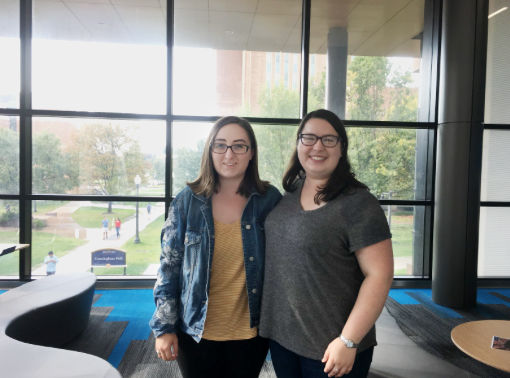Female science majors discuss challenges of being heard

Vice President Riley Weatherholt and President Tara Rogers of Kent State’s undergraduate chapter of Scientista.
Despite holding 47 percent of U.S. jobs in 2015, women filled only 24 percent of positions in science, technology, engineering and mathematics, otherwise known as STEM, according to the U.S. Department of Commerce.
For women pursuing careers in science, the lack of female representation does not go unnoticed. Senior molecular and cellular biology major Tara Rogers did not know any female scientists prior to college, making her feel isolated in choosing her major.
“I hadn’t known personally any women in science until I was in college, so I kind of felt alone when I was choosing a profession that I wanted to go into because there wasn’t anybody around me that could help guide me,” Rogers said.
Senior chemistry and environmental conservation biology major Riley Weatherholt also notices the small number of women in science. While she has had female professors in biology, she cannot say the same for chemistry.
“I’ve never had a female faculty member teach me in the chem department,” Weatherholt said.
Rogers and Weatherholt serve, respectively, as the president and vice president of Kent State undergraduate chapter of Scientista, a national organization geared toward empowering women in STEM.
Both Rogers and Weatherholt believe women in the sciences face the challenge of being heard when in the same room as men.
“I feel like I often have to talk louder or talk more in order to be heard rather than male counterparts in my major,” Rogers said.
Rogers attributes her speaking loudly and going out of her way to make herself stand out to the successes she has had in her major.
“If I hadn’t started approaching people, I wouldn’t have gotten scholarships,” Rogers said. “I wouldn’t have gotten a research fellowship.”
Similarly, Weatherholt thinks her direct style of communication allows her to be taken seriously as a woman in science.
“I feel like people take me very seriously because I am very blunt in my communication,” Weatherholt said. “I talk a lot in class, and I’m not afraid to raise my hand and correct the professor or do whatever I have to do.”
While Weatherholt feels heard, she said other women in science who do not speak loudly may struggle to feel as though their voices matter.
“There are a lot of more soft-spoken women that I know that probably don’t feel heard,” Weatherholt said. “I just feel like the men have to say less to earn the respect of the professor in some situations.”
Rogers perceives shyness as an obstacle blocking females from the sciences as well.
“There are a lot of shy women who want to get into science, and they can’t,” Rogers said. “I think there are definitely barriers of communication that prevent them from going into science.”
Both Rogers and Weatherholt agree that women should not be discouraged from pursuing careers in the sciences and should instead make opportunities for themselves.
“Just reach out to people,” Rogers said. “I feel like all the opportunities I’ve had have been because I talked to somebody.”
“You’ve got to be really forward,” Weatherholt said. “Make sure that you’re not just waiting for someone to help you, but you’re going out and getting that help that you need.”
Paige Bennett is the sciences reporter. Contact her at [email protected].


